Interview: Jackie Dennis, Scotland's first pop star
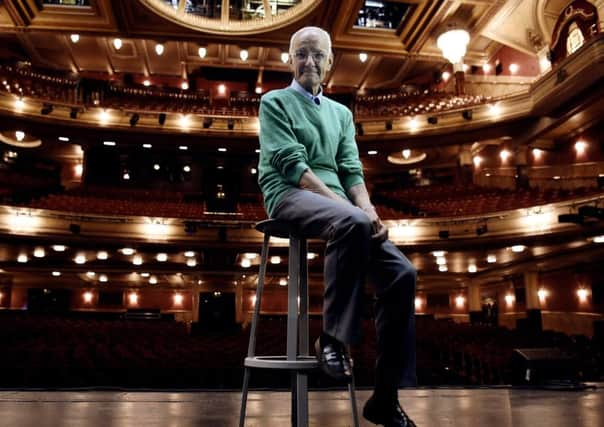

Raised in a tenement at 44 Brunswick Road, just off Easter Road, he was discovered at the tender age of 15 and very briefly took the world by storm with his unique brand of tartan-infused pop.
And 60 years ago this autumn, Jackie made history on the Perry Como show in New York. The ink was barely dry on his Leith Academy leaver’s certificate, yet here he was; the first British artist to appear on American television.
Advertisement
Hide AdAdvertisement
Hide AdBut like fellow Capital pop stars the Bay City Rollers, Jackie, who is now 75 and lives in Pilton, only saw a fraction of his overall earnings.
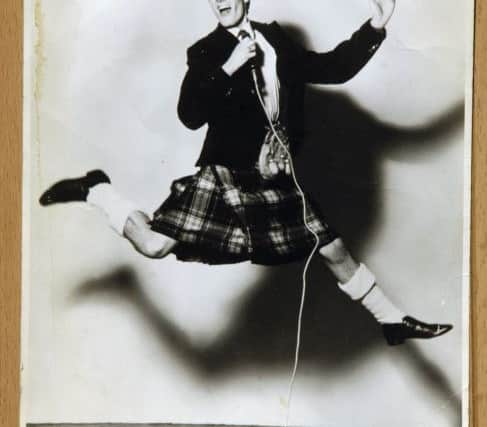

Speaking exclusively at Edinburgh’s Festival Theatre, where he performed numerous times back when it was known as The Empire, Jackie says his manager Eve (Evie) Taylor took the lion’s share of his monthly income.
“The BBC show that I was on ... Rip It Up? It was like my life. Rip it up – rip it off,” laughs Jackie.
“But I would never run Evie down. If it wasn’t for her, I wouldnae be telling all these stories.”
Advertisement
Hide AdAdvertisement
Hide AdA performer from a young age, Jackie left school at 15 to become an apprentice plumber.
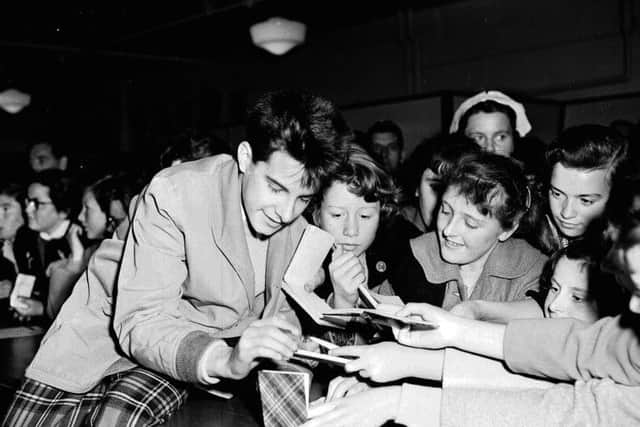

“I was a plumber for two weeks,” he says. “Like Alan Longmuir, God bless him.”
A proud Scot, Jackie was no stranger to a pair of tartan trews and the kilt soon became his trademark.
But his stage outfits, he insists, were an expression of his Scottish identity and not a tacky PR stunt. “It was my decision,” he says. “I wanted to wear the kilt, so I could represent Scotland. It was never a gimmick.”
Advertisement
Hide AdAdvertisement
Hide AdJackie got his big break in January 1958. He was performing to American troops at Prestwick military base where a certain Elvis Presley landed a little over two years later.
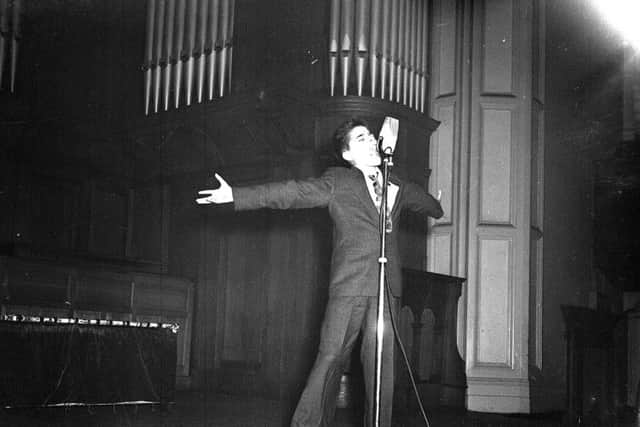

Watching him that day was comedy double act Mike and Bernie Winters. They liked what they saw.
“Mike and Bernie put me on to Evie Taylor,” Jackie explains. “The golden kid, the £50,000 kid. The lilt with the kilt, that’s what they called me.
“It was sing La Dee Dah or get a job. I picked La Dee Dah.”
La Dee Dah was Jackie’s breakthrough record. He performed it on the BBC’s Six-Five Special and watched as it climbed to number four in the hit parade.
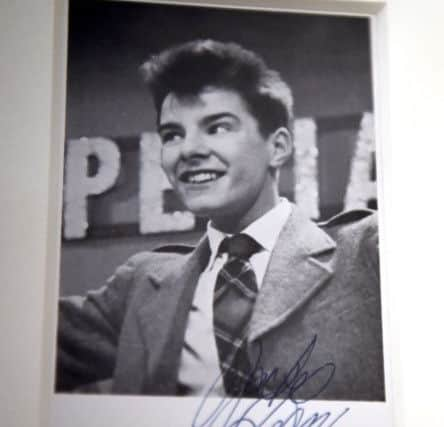

Advertisement
Hide AdAdvertisement
Hide Ad“The voice I had at the time would definitely be Frankie Lymon,” Jackie says. “He did the song Why Do Fools Fall In Love at 13 or so, like the Michael Jackson of his day in America.
“Probably you could class me like Scotland’s Michael Jackson, in that era.”
Growing up in 1950s Scotland, Jackie had never been on a plane, but suddenly he was jetting off all over the UK and Europe. Next up was the USA.
“To go to America, crossing Brooklyn Bridge, seeing all these skyscrapers – the hotel I was staying at was right opposite Central Park, the Barbizon-Plaza [today the Trump Parc] and I was up on the 24th floor,” Jackie says. “Looking out the window, I went dizzy.
Advertisement
Hide AdAdvertisement
Hide Ad“I just couldnae believe it. I started in February, this is October.”
Jackie was in New York for the Perry Como show. Looking back, he begins to well up.
“I loved him,” he says. “He was such a gentleman. He gave me one of the greatest accolades I’ll ever have.
“He said that Conway Twitty and I were the two great rising stars, that we’re such great performers.
Advertisement
Hide AdAdvertisement
Hide Ad“And I am going to cry because it brings back ... I do miss it.”
Perry sent Jackie a Christmas card every single year. In 1975, with Como booked to play Edinburgh’s Usher Hall, the American was keen to meet up.
“John Gibson from the Evening News told me Como’s manager had been on the phone,” he recalls. “‘They want to send a car for you, take you up to the Usher Hall, bring mum and dad’, he said.
“My mother loved Perry Como, that was her favourite singer. He gave her a kiss. My mother was so embarrassed, didn’t know where to look.
Advertisement
Hide AdAdvertisement
Hide Ad“He [Perry] said: ‘I’ll have to mention you’re in the auditorium’. And he did.”
On the Perry Como Show back in ‘58, the famous host had mispronounced Jackie’s hometown. Here was Como’s chance to remedy the mistake.
“At the Usher Hall,” continues Jackie, “Perry said: ‘I’d better get it right, ‘cause I was contradicted on the show – I’d said we’ve this young lad from Edinburg [sic], like a Scottish Ricky Nelson. Well, he corrected me, folks, and said ‘it’s Edinburr-aa!’. He’s sitting in the audience. We haven’t seen each other for years – Mr Jackie Dennis’.
“I didn’t know what to do. I just did not know what to do.”
However, not everyone Jackie met in showbiz was so warm and friendly.
Advertisement
Hide AdAdvertisement
Hide AdAt Las Vegas’ Desert Inn, Jackie shook hands with one of his heroes, Ol’ Blue Eyes himself, Frank Sinatra. He probably wishes he hadn’t.
Jackie recalls: “He swivelled round, shook my hand and told me to f*** off.”
Frank’s Rat Pack buddy Sammy Davis Jnr, however, was a different story.
“He was such a great guy,” Jackie says. “But the way America was then he had to go through the kitchens. They wouldn’t allow him through the front. I thought it was diabolical.”
Advertisement
Hide AdAdvertisement
Hide AdJackie’s visit to America could have been fatal had it not been for manager Eve Taylor, who, despite her avarice, was very protective of her young pop star. “They wanted me on tour with Buddy Holly, the Big Bopper and Ritchie Valens,” he says.
“The day the music died. I could’ve been on that tour.
“Evie protected me, told them ‘no’ because I was too young. I was doing pantomime at The Empire in Edinburgh and Glasgow when the plane crashed.”
During his short-lived recording career, Jackie made around ten records, including an EP.
As catchy as some of the melodies are, though, Jackie is aware their appeal remains confined to the 1950s.
He laughs: “They were silly songs, but they sold.”
Advertisement
Hide AdAdvertisement
Hide AdWhile living in London, Jackie encountered a future pop music legend right on his doorstep.
“John and Cynthia Lennon lived along the corridor from me at Maida Vale,” he says. “One day they came and asked to borrow a pint of milk.
“I’d seen The Beatles in Hamburg with Tommy Steele in this tatty club – a right dive. They were wild then, but Epstein – the jackets, the nice haircuts. Well, that was it.
“The Rolling Stones and The Beatles, they are the biggest things that ever happened.”
Advertisement
Hide AdAdvertisement
Hide AdAs humble as they come, Jackie is keen to mention another talented lad with whom he shared a bench at Leith Academy.
“Johnny Locke, he went down to London before me and made a record for a movie starring David McCallum,” Jackie says.
“He was one of the most talented laddies I ever met, but nobody ever talks about Johnny. It’s sad.”
Jackie is also keen to shy away from the “first pop star” tag.
Advertisement
Hide AdAdvertisement
Hide Ad“I always maintain it was Lonnie Donegan – and Nancy Whiskey, who’s never been mentioned,” he says.
Despite all the accolades, Jackie’s pop career was far from being the high point of his life.
“Showbiz dominated my life and it was very lonely at times.
“I was the first Scotsman to get into the hit parade, the first British artist to go over to America. As a plumber I couldn’t have done that, though I might’ve been happy.
“It was years later working in the care homes, that was 100 per cent the happiest I’ve ever been. I loved every minute.
“Looking after someone who needed my help, I reflect on myself. I needed someone to help me.”